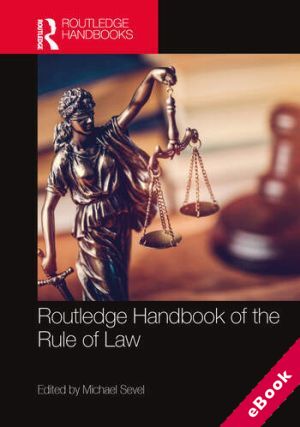
The device(s) you use to access the eBook content must be authorized with an Adobe ID before you download the product otherwise it will fail to register correctly.
For further information see https://www.wildy.com/ebook-formats
Once the order is confirmed an automated e-mail will be sent to you to allow you to download the eBook.
All eBooks are supplied firm sale and cannot be returned. If you believe there is a fault with your eBook then contact us on ebooks@wildy.com and we will help in resolving the issue. This does not affect your statutory rights.
This Handbook provides a state-of-the-art survey of the study of the rule of law across law, the humanities, and social sciences, as well as insights into the practice of building the rule of law within and among states. Its twenty-eight chapters are by many of the world’s leading scholars of the rule of law, as well as distinguished junior scholars, from a dozen countries and representing a number of academic disciplines. The chapters are ordered to progress, first, from theory to the practice of the rule of law and, second, from the rule of law within, to beyond, the state. They divide into three parts.
The first part examines the concept, history, and value of the rule of law. This section considers the importance of political and intellectual history in shaping the concept over the centuries, and takes novel philosophical approaches to the connection between the rule of law and other important ideals such as justice, equality, and civil disobedience. The second part transitions from theoretical studies to accounts of practical exercises in building the rule of law. The chapters consider the challenges of rule of law reform, including the use of local intermediaries facilitating interactions between international legal aid organizations and state governments, the challenges of legal translation across vastly different societies, the pathways of knowledge among the powerless about the protective potential of the rule of law, as well as the possible future for artificial intelligence systems in helping to reinforce rule-of-law principles. The third part examines the rule of law from a number of perspectives within particular supranational and national states, such as the European Union, China, Singapore, and South Africa, among others, and concludes by considering the prospects of the rule of law beyond the state, both within and among international institutions such as the United Nations, as well as non-territorial spaces like the world’s oceans.
This Handbook is aimed at rule of law scholars across law, the humanities, and the social sciences, law and development practitioners, policymakers, and advanced students and researchers who seek a state-of-the-art overview of the history, theory, and practice of the rule of law.